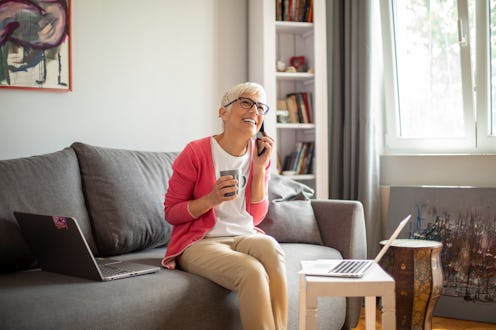Health
How To Help Your Grandparents Cope With Loneliness During The Pandemic
There are ways you can offer support safely.

On March 23, when England first went into lockdown the government outlined that people over the age of 65 may be the most vulnerable to severe symptoms of COVID-19. Since then older people have advised to stay indoors and avoid meeting with people from outside their household. This has cut them off from loved ones and any face-to-face social life they may have had before. Charities have outlined that this has had a massive impact on older people’s mental health. If you’re worried that your grandparents may be feeling isolated there are resources and ways you can help.
On Dec. 27, Dr Adrian James, the president of the Royal College of Psychiatrists said the pandemic has posed the greatest threat to mental health since the second world war, with the impact to be felt for years to come. Leading mental health charity, Mind detailed that 60% of adults and over two thirds of young people (68%) have said their mental health has got worse in lockdown. However, further research found that isolation during the pandemic could be more difficult for older people and not being able to see loved ones may be exacerbating existing mental health conditions.
It’s estimated that 2.8 million people over the age of 70 live alone in the UK and Age UK have reported that the number of over-70s who have reported feeling depressed has doubled since the start of the pandemic. Changes to restrictions over Christmas may have meant you couldn’t be with older relatives. If you’re worried that they’re feeling lonely or down and want to support them, here’s how you can help.
Ways You Can Help
Call
Not being able to have a cup of tea with your Nan or Granddad has been painfully hard, especially around Christmas. However, by calling regularly, knocking on the door and standing at the edge of the drive, or showing them how to video call will help you stay in the loop with what they’ve been up to. You can chat, find out if they need anything, and even play games.
Help Out
Many over-70s have reported feeling more anxious than ever and this may be exacerbated by having to book a food shopping delivery slot or going out to the supermarket. When you can, drop off shopping for them and have a quick chat once you’re done. If you’re going to the shops for you then it’s not an extra journey but could ease their worries.
Go The Extra Mile
Over the last ten months it’s become abundantly clear how important small joys can be. Show your loved one that you’re thinking of them by writing them a card, dropping off a small gift, or sending them pictures of what you’ve been up to. It may not seem like a big deal but getting post is something everyone finds exciting and shows them you’re thinking about them.
Resources
Age UK
Throughout the pandemic Age UK have been a leading advocate speaking up for the needs of older people in the UK. They have a whole section on their website dedicated to COVID-19 queries and advice on what you can do.
For additional support you can call 0800 169 65 65 for practical advice. For a general chat their support line is open day or night on 0800 470 80 90.
Re-Engage
Re-Engage works all year round to provide support for older people who live alone. Their call companion service can match up an older person with someone to regularly speak to in lockdown. Similarly, they run events and reading groups.
Independent Age
One of the most difficult things about COVID-19 has been not having people around for practical help. Independent Age provides advice on loneliness and grief, housing, money, and so much more.
You can call their helpline on 0800 319 6789.
Hello Fresh
If you’d like to gift a delicious meal to your grandparents then HelloFresh is an awesome option. Instead of going to the shops, the ingredients will be delivered right to their door.
They can decide when they have each of the meals and you can get it on a rolling subscription so a few meals every week will be taken care of by you. You could even get the same boxes and cook and eat your meals over a video call.
Mind
Mind has worked tirelessly throughout the pandemic to highlight the effects it has had on people’s mental health. It can be difficult to verbalise when you’re feeling down, depressed, or anxious. If you’re worried about the mental health of a loved one the Mind website has lots of resources with a focus on COVID-19.
Golden Carers
One of the toughest things over the last ten months has been trying to find things to keep yourself busy. Golden Carers has tapped into that and produced an extensive list of all of the activities that are both COVID-19-safe and more interesting than watching back to back TV. You can gift your grandparents a painting by numbers, puzzle, or crossword. Alternatively, you could buy them a gardening guide.
MentalHealth.org
This time has been really uncertain and for so many people the “unknown” factor of the pandemic has been the worst. MentalHealth.org has put a document together, targeted at older adults, that outlines how to stay safe, look after their mental health, and find out what support they’re entitled to.
This article was originally published on